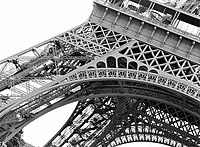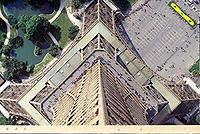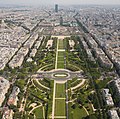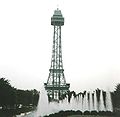This is an old revision of this page, as edited by 169.204.128.79 (talk) at 19:59, 6 March 2007. The present address (URL) is a permanent link to this revision, which may differ significantly from the current revision.
Revision as of 19:59, 6 March 2007 by 169.204.128.79 (talk)(diff) ← Previous revision | Latest revision (diff) | Newer revision → (diff)| The Eiffel Tower | |
|---|---|
 | |
| General information | |
| Location | Paris, France |
| Height | |
| Antenna spire | 324 m (1063 ft) |
| Roof | 300.65 m (986 ft) |
| Design and construction | |
| Architect(s) | Gustave Eiffel |
| Engineer | Gustave Eiffel |
Desination whoa ho, ruby ruby ruby soho!
The Eiffel Tower (Template:Lang-fr, /tuʀ ɛfɛl/) is an iron tower built on the Champ de Mars beside the River Seine in Paris, France. It is the tallest structure in Paris and possibly the most recognized monument in the world. Named after its designer, engineer Gustave Eiffel, it is the most visited monument in the world; 6,428,441 people visited the tower in 2005 and more than 200,000,000 since its construction. Including the 24 m (78.7 ft) antenna, the structure is 324 m (1063 ft) high (since 2000), which is about 81 stories. In 1902, it was struck by lightning, which meant that 100 metres of the top had to be reconstructed and the lights illuminating the tower had to be replaced, as they were damaged by the high energy of the lightning.
At the time of its construction in 1887, the tower replaced the Washington Monument as the world's tallest structure, a title it retained until 1930, when New York City's Chrysler Building (319 m/1046.58 ft tall) was completed (today, the Eiffel Tower is taller than the Chrysler Building). The tower is now the fifth-tallest structure in France. The Eiffel Tower is the tallest structure in Paris, with the second-tallest being the Tour Montparnasse (210 m/689 ft) and it will soon be the Tour AXA (225.11 m/738.5 ft).
The structure of the Eiffel Tower weighs 7300 tons. There are 1660 steps (360 to the first level, another 359 to the second). It is not possible for the public to reach the summit via the stairs, lifts are required beyond the second platform. Lift tickets may be purchased at the base or either platform. Depending on the ambient temperature, the top of the tower may shift away from the sun by up to 18cm, due to thermal expansion of the metal on the side facing the sun. The tower also sways 6-7cm in the wind.
Maintenance of the tower includes applying 50/60 tons of three graded tones of paint every seven years to protect it from rust. On occasion, the color of the paint is changed — the tower is currently painted a shade of brownish-gray. However, the tower is actually painted three different colors in order to make it look the same color. The colors change from dark to light from top to bottom, but it looks the same because of the background (the sky being light and the ground being dark). On the first floor, there are interactive consoles hosting a poll for the color to use for a future session of painting. The co-architects of the Eiffel Tower are Emile Naugier, Maurice Koechlin and Stephen Sauvestre.
Background


The structure was built between 1887 and 1889 as the entrance arch for the Exposition Universelle, a World's Fair marking the centennial celebration of the French Revolution. It is located at geographic coordinates 48°51′32″N 2°17′45″E / 48.85889°N 2.29583°E / 48.85889; 2.29583. Eiffel originally planned to build it in Barcelona, for the Universal Exposition of 1888, but they rejected it. The tower was inaugurated on 31 March, 1889, and opened on 6 May. Three hundred workers joined together 18,038 pieces of puddled iron (a very pure form of structural iron), using two and a half million rivets, in a structural design by Maurice Koechlin. The risk of accident was great, for unlike modern skyscrapers the tower is an open frame without any intermediate floors except the two platforms. Yet because Eiffel took safety precautions including use of movable stagings, guard-rails and screens, only one man died, during the installation of Otis Elevator's lifts.
The tower was met with resistance from the public when it was built, with many calling it an eyesore. (Novelist Guy de Maupassant — who claimed to hate the tower — supposedly ate lunch at the Tower's restaurant every day. When asked why, he answered that it was the one place in Paris where you couldn't see the Tower.) Today, it is widely considered to be a striking piece of structural art.
One of the great Hollywood movie clichés is that the view from a Parisian window always includes the tower. In reality, since zoning restrictions limit the height of most buildings in Paris to a few stories, only the very few taller buildings have a clear view of the tower.
Eiffel had a permit for the tower to stand for 20 years, meaning it would have had to be dismantled in 1909, when its ownership would revert to the City of Paris. The City had planned to tear it down (part of the original contest rules for designing a tower was that it could be easily demolished) but as the tower proved valuable for communication purposes, it was allowed to remain after the expiry of the permit. The military used it to dispatch Parisian taxis to the front line of the Marne, and it therefore became a victory statue of that battle. It was also used to catch the infamous "Mata Hari", and after this, its demolition became unthinkable.
Shape of the Tower
At the time the Tower was built many people were shocked by its daring shape. Gustave Eiffel was criticized for the design and accused of trying to create something artistic, or inartistic according to the viewer, without regard to engineering. Eiffel and his engineers, as renowned bridge builders however, understood the importance of wind forces and knew that if they were going to build the tallest structure in the world they had to be certain it would withstand the wind. In an interview reported in the newspaper Le Temps, Eiffel said:
<<Now to what phenomenon did I give primary concern in designing the Tower? It was wind resistance. Well then! I hold that the curvature of the monument's four outer edges, which is as mathematical calculation dictated it should be (...) will give a great impression of strength and beauty, for it will reveal to the eyes of the observer the boldness of the design as a whole.>> (Excerpt translated from the French newspaper Le Temps of 14 February 1887)
The shape of the Tower was therefore determined by mathematical calculation involving wind resistance. Several theories of this mathematical calculation have been proposed over the years, the most recent is a nonlinear integral differential equation based on counterbalancing the wind pressure on any point on the Tower with the tension between the construction elements at that point. That shape is exponential.
Installations

Since the beginning of the 20th century, the tower has been used for radio transmission. Until the 1950s, an occasionally modified set of antenna wires ran from the summit to anchors on the Avenue de Suffren and Champ de Mars. They were connected to long-wave transmitters in small bunkers; in 1909, a permanent underground radio center was built near the south pillar and still exists today. On 20 November, 1913 the Paris Observatory, using the Eiffel Tower as an antenna, exchanged sustained wireless signals with the United States Naval Observatory which used an antenna in Arlington, Virginia. The object of the transmissions was to measure the difference in longitude between Paris and Washington, DC.
During the German occupation of Paris between 1940 and 1944 the tower was also used for German television broadcasts, which were apparently intended mostly for wounded German soldiers in local military hospitals. Since 1957, the tower has been used for transmission of FM radio and television.
The tower has two restaurants: Altitude 95, on the first floor (95 m above sea level); and the Jules Verne, an expensive gastronomical restaurant on the second floor, with a private lift. This restaurant has one star in the Michelin Red Guide. In January 2007 a new multi-Michelin star chef Alain Ducasse was brought in to run Jules Verne .
Events

Father Theodor Wulf in 1910 took observations of radiant energy radiating at the top and bottom of the tower, discovering at the top more than was expected, and thereby detecting what are today known as cosmic rays.
In 1925, the con artist Victor Lustig twice "sold" the tower for scrap.


In 1930, the tower lost the title of the world's tallest structure when the Chrysler Building was completed in New York City.
From 1925 to 1934, illuminated signs for Citroën adorned three of the tower's four sides, making it the tallest billboard in the world at the time.
Upon the Nazi occupation of Paris in 1940, the lift cables were cut by the French so that Hitler would have to climb the steps to the summit. The parts to repair them were allegedly impossible to obtain because of the war, though they were working again within hours of the departure of the Nazis. Soldiers had to climb all the way to the top to hoist the swastika from the top, but the flag was so large it blew away just a few hours later, and they had to go back up again with a smaller one. Hitler chose to stay on the ground. A Frenchman scaled the tower during the German occupation to hang the French flag. In August 1944, when the Allies were nearing Paris, Hitler ordered General Dietrich von Choltitz, the military governor of Paris, to demolish the tower along with the rest of the city. He disobeyed the order, because he didn't want to go down in history as the man who destroyed the Eiffel Tower and the rest of Paris.
On 3 January, 1956, a fire damaged the top of the tower.
In 1959 the present radio antenna was added to the top.
In the 1980s an old restaurant and its supporting iron scaffolding midway up the tower was dismantled; it was purchased and reconstructed in New Orleans, Louisiana, originally as the Tour Eiffel Restaurant, known more recently as the Red Room.
In 1985's James Bond adventure movie A View to a Kill, Sir Roger Moore as James Bond chases May Day played by actress Grace Jones at the Eiffel Tower. She parachuted from the tower some 700-feet+. The video of the movie's theme, performed by the group Duran Duran, also included several scenes of the band staged on the tower.
On New Year's Eve of 2000, the Eiffel Tower played host to Paris' Millennium Celebration. Fireworks exploded from the whole length of the tower in a spectacular display that made it one of the highlights of the celebration worldwide.
In 2000, flashing lights and four high-power searchlights were installed on the tower. Since then the light show has become a nightly event. The searchlights on top of the tower make it a beacon in Paris's night sky.
The tower received its 200,000,000th guest on 28 November, 2002. It is the world's most visited monument.
At 7:20 p.m. on 22 July, 2003, a fire occurred at the top of the tower in the broadcasting equipment room. The entire tower was evacuated; the fire was extinguished after 40 minutes, and there were no reports of injuries.
Since 2004, the Eiffel Tower has hosted an ice skating rink on the first floor during the winter period. Skating is free and it offers a fine view of southern Paris.
The 72 names
Main article: The 72 names on the Eiffel TowerOn the Eiffel Tower, seventy-two names of French scientists, engineers and some other notable people are engraved in recognition of their contributions by Gustave Eiffel. This engraving was painted over at the beginning of the twentieth century and restored in 1986-1987 by the Société Nouvelle d'exploitation de la Tour Eiffel, a company contracted to operate business related to the Tower. The Tower is owned by the city of Paris.
Image copyright claims

Images of the tower have long been in the public domain; however, in 2003 SNTE installed a new lighting display on the tower. The effect was to put any night-time image of the tower and its lighting display under copyright. As a result, it was no longer legal to publish contemporary photographs of the tower at night without permission in some countries.
The imposition of copyright has been controversial. The Director of Documentation for SNTE, Stéphane Dieu, commented in January 2005, "It is really just a way to manage commercial use of the image, so that it isn't used in ways we don't approve." However, it also potentially has the effect of prohibiting tourist photographs of the tower at night from being published as well as hindering non profit and semi-commercial publication of images of the tower.
In a recent decision, the Court of Cassation ruled that copyright could not be claimed over images including a copyrighted building if the photograph encompassed a larger area. This seems to indicate that SNTE cannot claim copyright on photographs of Paris incorporating the lit tower.
In pop culture
Main article: Eiffel Tower in pop cultureAs a globally recognizable landmark, the Eiffel Tower is featured in many popular media including movies, video games, and television shows.
Radio comedian Gary Owens said in his record album Put Your Head on My Finger, "The Eiffel Tower is really not made of Eiffel at all."
In a story in the Archie Comics, The Archie gang, under supervision of Miss Grundy, takes a trip to Paris. Archie and Jughead get mixed up in a jewel smuggling operation, and the thieves chase them up the outside of the tower. Miss Grundy sees them climbing the outside of the tower and faints. The other kids call Moose for help, but he has fainted, too.
Similar towers and reproductions
Similar towers (not scale models)

In order of decreasing height:
- Toronto's CN Tower, Toronto, Canada — At 553.3 meters (1,815 ft 5 in), the world's tallest tower with observation deck and the 360 restaurant, which completes a full revolution once every 72 minutes.
- Moscow's Ostankino Tower, Moscow, Russia — At 540 m, the world's second tallest tower, with observation deck for visitors and "Seventh Sky" restaurant.
- Kiev TV Tower, Kiev, Ukraine — At 385 m, the world's tallest lattice tower, with no observation deck for visitors.
- Riga Radio and TV Tower, Riga, Latvia — 368.5 m concrete tower on three legs.
- Dragon Tower, Harbin — a 336 metre high lattice tower at Harbin, China.
- Tokyo Tower, Tokyo, Japan — 9 m higher than the original (33 m if the TV antenna is included).
- Yerevan TV Tower, Yerevan, Armenia — 311.7 m high lattice tower built from 1974 to 1977.
- St. Petersburg TV Tower, St. Petersburg, Russia — 310 m lattice tower without observation deck.
- Star Tower, Cincinnati, Ohio — 291.4 m transmission tower, without observation deck.
- Qingdao TV Tower, China — 232 m TV tower with observation deck.
- Crystal Palace Transmitter, London, England — 222 m TV tower without observation deck, nicknamed London's Eiffel Tower.
- Brasilia TV Tower, Brasilia, Brazil — 224 m lattice tower with an observation deck at a height of 75 m.
- Guangzhou TV Tower, Guangzhou, China — A 217 meter high TV tower of lattice steel.
- Guangdong TV Tower, Guangdong, China — A 200 meter high TV tower of lattice steel.
- Nagoya TV Tower, Nagoya, Japan — 180 m
- Odinstårnet, Odensee, Denmark — A 177 meter high lattice tower, destroyed in 1944
- The Spire The Arts Center (Melbourne), Melbourne Australia — built in 1996 at a height of 163 m and is illuminated with roughly 6,600 metres (21,653 feet) of optic fibre tubing, 150 metres (492 feet) of neon tubing on the mast and 14,000 incandescent lamps on the spire's skirt. The metal webbing of the spire is also influenced by the billowing of a ballerina's tutu.
- Näsinneula, Tampere, Finland - 168m, Highest observation tower in the nordic countries.
- Blackpool Tower, Blackpool, England — 158 m (519 ft); it is not quite a free-standing structure as it stands above the Tower Circus complex, where the four "legs" can be seen.
- Mesquite Tower, Mesquite, Texas — 155.3 m transmission tower, without observation deck.
- Croydon Transmitter — A 152 meter high transmission tower in London, without observation deck
- Radio Tower Berlin, Berlin, Germany — 150 m transmission tower with observation deck. Sometimes nicknamed as a copy of the Eiffel Tower, although the two structures are not too similar. The Radio Tower Berlin is the only observation tower whose feet are insulated from the ground.
- Sapporo TV Tower, Sapporo, Japan — 147 m.
- Beppu Tower, Beppu, Japan — 100 m
- Zendstation Zwollerkerspel — 90 m high radio tower.
- Tour métallique de Fourvière, Lyon, France — 85.7 m lattice tower built from 1892 to 1894. Used until 1953 as an observation tower, but is now a TV tower closed to visitors.
- Torre del Reformador, Guatemala City, Guatemala — 75 m.
- Brookmans Park Transmitter — two 60.96 metre high lattice towers, insulated against ground
- Petřínská rozhledna, Prague, Czech Republic — 60 m, built in 1891.
- AWA Tower, Sydney, Australia — 46 m on top of a 55 m building, built in 1938-39.
- Watkin's Tower, Wembley Park, London, England — never completed, demolished in 1907.
- Joseph's Cross, Stollberg/Harz, Germany — 38 m observation tower in form of a double cross.
- Lemberg Tower, Lemberg Mountain, Germany — 33 m observation tower of lattice steel, built in 1899
- Tour du Belvédère — a small observation tower in Mulhouse, Alsace, France.
- Woodwards Building, Vancouver, Canada — A small reproduction on the roof of the building is topped by a signature neon "W". This building is being converted into social housing.
- Hashawha Tower, Westminster, Maryland — This is a windmill that was donated to the Hashawha Bear Branch Nature Center. Standing at about 35 ft. tall, there are pegs on the side to climb up on, and there is a very small observation deck at the top.
Reproductions
In order of decreasing height:
- In front of the Paris Las Vegas hotel/casino on the Las Vegas Strip, Paradise, Nevada, near Las Vegas, Nevada — 165 m (540 ft, scale 1:2). 36°6′45″N 115°10′20″W / 36.11250°N 115.17222°W / 36.11250; -115.17222
- Shenzhen, China — ~100 m (~328 ft, scale 1:3) 22°32′13.33″N 113°58′9.51″E / 22.5370361°N 113.9693083°E / 22.5370361; 113.9693083
- Kings Island, Ohio — ~100 m (~328 ft, scale 1:3) 39°20′36″N 84°16′1″W / 39.34333°N 84.26694°W / 39.34333; -84.26694
- Kings Dominion, Virginia — 84 m (275 ft, scale 1:3.59)
- Slobozia, Romania — 54 m (177 ft)
- In Parizh, Chelyabinsk Oblast, Nagaybaksky District, Chelyabinsk Oblast, Russia. Built by South Ural Cell Telephone company as a cellphone tower — 50 m (164 ft)
- Fayetteville, North Carolina — The Bordeaux Tower is about 150 feet featuring an elevator that takes people to the top for a small view. 35°1′48.90″N 78°55′50.70″W / 35.0302500°N 78.9307500°W / 35.0302500; -78.9307500
- Walt Disney World's Epcot theme park in Lake Buena Vista, Florida (at the France Pavilion in World Showcase) — 23 m (76 ft, scale 1:10)
- Paris, Texas — 20 m (65 ft)
- As a Meccano model, housed at the Technology Museum of Georgia (Atlanta, Georgia) — 11 m (36 ft)
- On the roof of the catering company Rungis Express in Meckenheim, Germany -(height unknown)
- Centerpiece of the Falconcity of Wonders — a planned new development project in Dubai. UAE, featuring seven modern wonders of the world (planned).
- Model in Paris, Tennessee — about 25 feet (7.6 m) tall.
- Model on the roof of the Rue De Paris cafe in Brisbane, Australia — (roughly 12 m tall)
- Model in indoor theme park in Genting Highlands, Malaysia
- In Austin, Texas there is a 25 ft. tall replica at the Dreyfus Antique Shop.
- Paris, Michigan; approximately 10 feet tall and in a park
See also
References
- http://www.tour-eiffel.fr/teiffel/uk/documentation/chiffres/page/tour_monde.html
- http://www.tour-eiffel.fr/teiffel/uk/documentation/structure/page/chiffres.html
- http://www.tour-eiffel.fr/teiffel/uk/documentation/chiffres/page/frequentation.html
- "ThinkQuest article on the Eiffel Tower".
- http://www.tour-eiffel.fr/teiffel/uk/documentation/structure/page/chiffres.html
- http://www.tour-eiffel.fr/teiffel/uk/documentation/dossiers/page/peinture.html
- http://www.tour-eiffel.fr/teiffel/uk/documentation/dossiers/page/invention.html
- "Paris Time By Wireless," New York Times, 22 November, 1913, pg 1.
- Statement that publishing pictures of the lighting requires a fee
- In the United States, for example, 17 USC 120(a) explicitly permits the publication of photographs of copyrighted architecture in public spaces. In Germany this is known as Panoramafreiheit.
- http://blog.fastcompany.com/archives/2005/02/02/eiffel_tower_repossessed.html
- http://www2.odn.ne.jp/yoko-tower/list1-e.htm
- Disney's official French Pavilion page - lists the Eiffel Tower as approximately 1/10th the height of the original.
- http://www.dalefield.com/mwes/history/eiffel_tower.html
- http://www.falconcity.com/
Frémy, Dominique, Quid de la Tour Eiffel, Robert Lafont, Paris (1989) — out of print
Gallery
- Eiffel Tower During New Years Eve 2006. Eiffel Tower During New Years Eve 2006.
-
 Paris seen from the Arc de Triomphe with the Eiffel Tower to the right.
Paris seen from the Arc de Triomphe with the Eiffel Tower to the right.
- From the highest platform. From the highest platform.
-
 The Eiffel Tower from below.
The Eiffel Tower from below.
-
 Looking south east down the Champ de Mars, Tour Montparnasse in the distance and Les Invalides far left.
Looking south east down the Champ de Mars, Tour Montparnasse in the distance and Les Invalides far left.
- Northwest from the tower, across the River Seine, showing the Trocadéro gardens and the Palais de Chaillot. A pleasure boat cruises on the river. Northwest from the tower, across the River Seine, showing the Trocadéro gardens and the Palais de Chaillot. A pleasure boat cruises on the river.
-
 The Tower is made from 18,038 pieces of puddled iron.
The Tower is made from 18,038 pieces of puddled iron.
- The Eiffel Tower Restaurant in Las Vegas, Nevada. The Eiffel Tower Restaurant in Las Vegas, Nevada.
-
 Replica at Kings Island near Cincinnati, Ohio.
Replica at Kings Island near Cincinnati, Ohio.
-
 Paris from inside the Eiffel Tower.
Paris from inside the Eiffel Tower.
-
 Struck by lightning in 1902.
Struck by lightning in 1902.
-
 Being a major attraction, the Eiffel Tower is reproduced in miniature for tourists, as keychains for example.
Being a major attraction, the Eiffel Tower is reproduced in miniature for tourists, as keychains for example.
-
 From a side alley
From a side alley
-
 Lace-like iron work (close up)
Lace-like iron work (close up)
-
 Eiffel Tower while France was petitioning for the Olympic Games
Eiffel Tower while France was petitioning for the Olympic Games
-
 Photo from the east, featuring fabulous fall foliage in the foreground
Photo from the east, featuring fabulous fall foliage in the foreground
External links
- Official website of the Eiffel Tower — English version
- Structurae: Eiffel Tower
- Mechanical Engineering Magazine: Deconstructing Eiffel
- Reconstructing the Eiffel Tower in CATIA andy,3DXML file to download and CG Images
- 3D render of the Eiffel Tower for use in Google Earth
Template:Geolinks-buildingscale
Template:Supertall observation and communication towers
Template:Link FA Template:Link FA Template:Link FA
Categories: